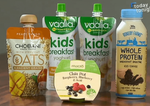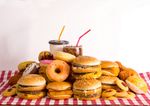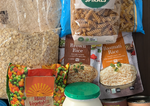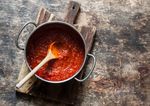An epidemic of junk food marketing
by Ainslie Sartori, Obesity Prevention Manager, Cancer Council WA
- May 19, 2020
- Leave a comment
- Families
- Health professionals
- Marketing
- Healthy eating
- Sugary drinks
- Case studies
- Industry
- Junk Food
- Research
- Public Health
- Advocacy
We are still being asked to stay home in order to protect our health and that of others in the community. Junk food companies and fast food restaurants have been quick to cash in on the COVID-19 crisis and this advice to stay home by shifting their marketing focus with lightening speed. Sadly, the tactic appears to be working, with more than 1 in 4 (27%) Aussies in a recent YouGov survey reporting eating a less healthy diet since the pandemic started. And we’re not alone; a similar trend has been found internationally.
Thankfully, we’ve been spared the usual onslaught of junk food marketing at large sporting events as national and international sports are on hold or postponed. While this might mean we are not being “rewarded” with a free burger when a footy player kicks a goal from outside the 50m line or inundated with ads for junk food and sugary drinks during the Olympics, instead we are told we can collect our “essentials”, such a bread and milk, from McDonald’s.
Far from providing a public service, McDonald’s aim is to bring more customers into their stores. It’s hard to imagine that customers aren’t being asked if they “want fries with that” when they go through a drive-thru to pick up bread and milk. McDonald’s have also added other marketing tactics to their arsenal during the public health crisis, including offering free delivery with UberEats. Ironically, many junk food chains are advertising their cashless and contactless home delivery service, highlighting their health and safety measures, while simultaneously pushing their unhealthy food products onto the community. Researchers from the UK have revealed that people who are overweight or obese are more at risk of developing COVID-19 complications, and a healthy diet is known to promote a healthy immune system.
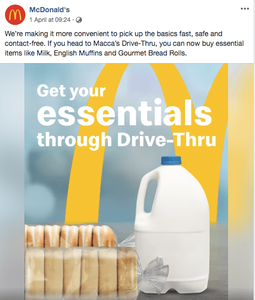
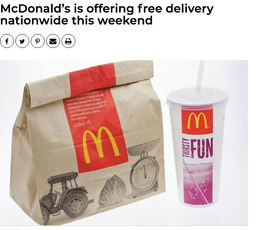
Other fast food chains have also been quick to adapt their marketing strategies. Subway is promoting having a “sub on your sofa” or a “wrap in your robe”, while Domino’s Australia have asked us to consider “5 reasons to eat pizza in isolation.” Meanwhile, Red Rooster is using the pandemic to try and make themselves seem relevant and relatable.

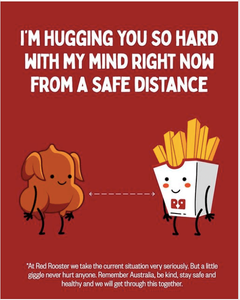
Targeting bored kids is another sneaky strategy being used by the junk food industry. Krispy Kreme is promoting donuts and screen time as the perfect multitasker (sigh), while Skittles is encouraging kids to use their product to create art. The last thing stressed out parents need is the added pester power for junk food brought on by this insidious type of marketing.
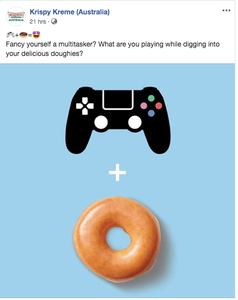
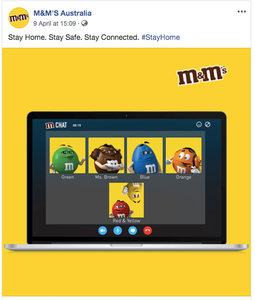
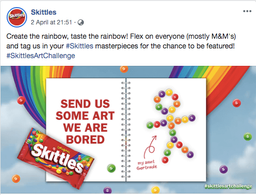
Many fast food chains have been offering free food or drinks to healthcare workers, as well as featuring images of these workers in their marketing campaigns. This is a shameless ploy to try and claim some of the public goodwill towards essential workers that has been a feature of this pandemic. While donations of food and beverages to healthcare and other essential workers may be seen as a way of showing appreciation for these groups, it’s hard not to be cynical about the intent. Arguably one of the worst examples of this has been Domino’s which has just launched a new ad featuring their CEO who states: “We are playing our part to keep Australians safely fed.”
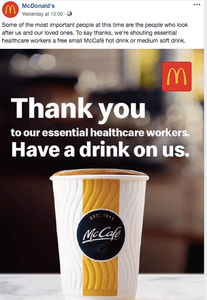
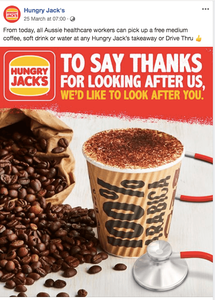
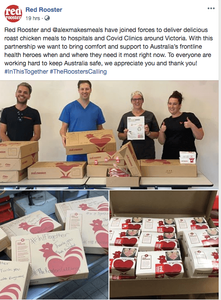
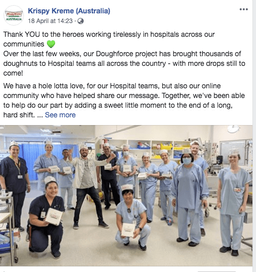
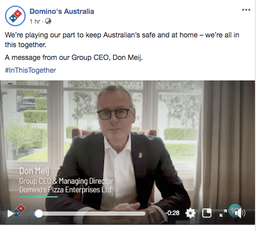
We have already seen how the alcohol industry has quickly shifted its tactics in order to use the pandemic to its marketing advantage. Alarmingly, it’s working, with alcohol sales up compared to the same time last year and 1 in 5 people reporting that their household is buying more alcohol than usual since the COVID-19 restrictions were implemented.
The predatory marketing strategies of the junk food industry during this public health crisis creates ethical challenges. Advertising that preys on the uncertainty, fear and boredom of the community during a time in which people are vulnerable and physically isolated is concerning, particularly for those experiencing the most social and economic disadvantage. Is the heavy promotion of junk foods and drinks the type of messaging we need? We urge Australians to push back against these marketing strategies and question who is really benefiting from the promotions.
More tips and tricks to stay healthy at home
